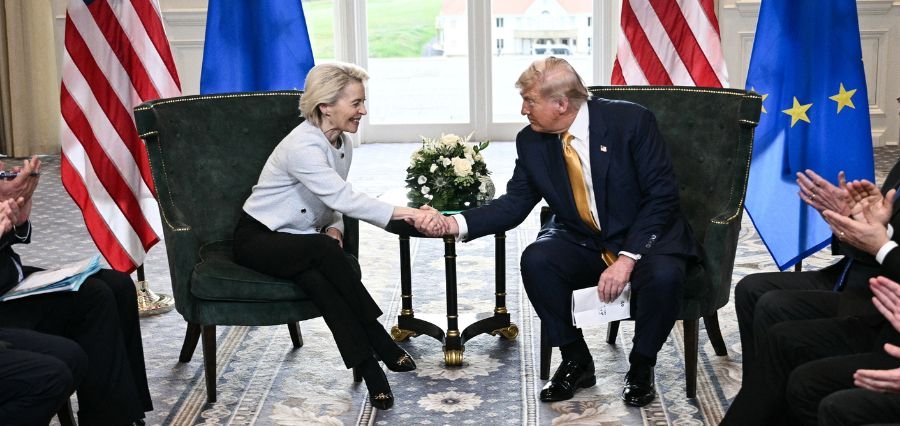Prime Highlights
- U.S. and EU sign a trade agreement that puts 15% tariffs on most EU products, avoiding an imminent trade war.
- The EU commits $750 billion in U.S. energy exports and $600 billion in U.S. investments under the agreement.
Key Facts
- An agreement in place prevents threatened 30% tariffs and keeps 50% tariffs on steel and aluminum, turning to quota systems soon.
- Strategic industries like semiconductors, chemicals, aircraft parts, and farm produce will be accorded zero tariffs.
Key Background
The United States and the European Union have struck a major trade agreement to avoid a transatlantic trade war. On July 27, 2025, US President Donald Trump and European Commission President Ursula von der Leyen unveiled the deal that ends the duty of a 15 tariff on the vast maturity of EU exports, much lower than the 30 rate preliminarily pledged.
The European Union, on the other hand, committed to invest $750 billion in U.S. energy resources, including oil, liquefied natural gas, and nuclear fuel, in the next three years. The EU also committed to invest $600 billion in direct investment in the U.S., including commercial enterprises, technology companies, and defense equipment production. This record economic pledge has been considered a strategic move in an attempt to negotiate favorable terms and stabilize transatlantic relationships.
The deal also includes zero tariffs on precedence sectors similar as aircraft corridor, semiconductors, chemicals, agrarian products, raw accoutrements , and inputs for medicinals. still, sword and aluminum continue to be smacked with draconian 50 tariffs, although there were rumors that these would get replaced by share- grounded tariffs in the coming weeks.
While the American officials were preoccupied with hailing the deal as a colossal economic and diplomatic victory, European critics argued that it signifies the EU’s reduced negotiating clout. The bloc had originally demanded a tariff cap of 10%, which it traded off for a halt to tariff tit-for-tat, they argue.
The accord is to be ratified by the EU parliaments and member states, with ambiguity as to how the energy purchasing and investment pledges are enforced. Political turmoil, court challenges to Trump’s tariffs, or discord on adherence pose concerns among analysts that undermine the long-term viability of the accord. The accord gives some short-term reassurance to the industries on both sides of the Atlantic in anticipation of a worst-case trade war.
Read More : Thriving Amid Uncertainty and Disruption




